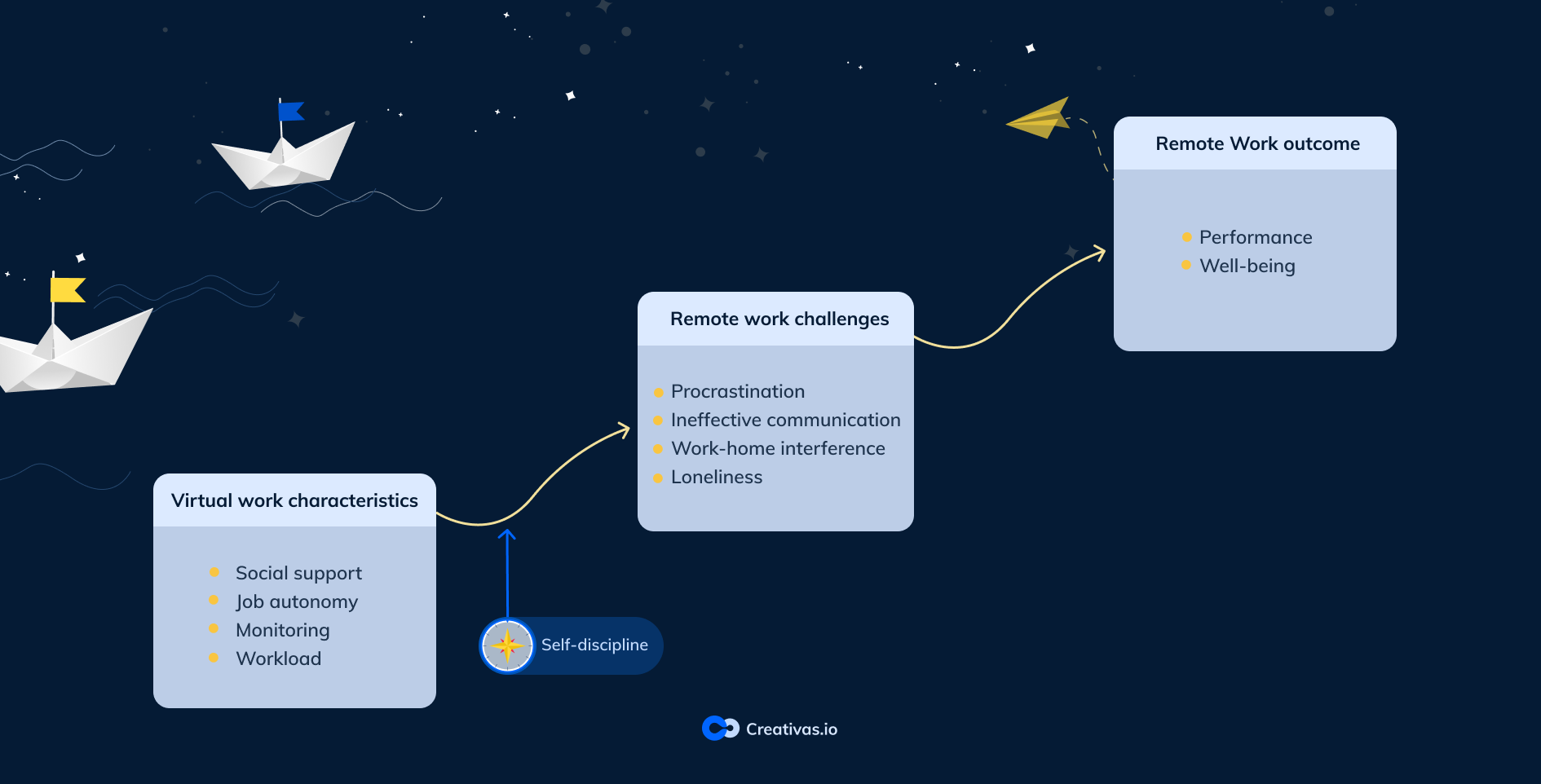
How to keep a rocking work outcome while working from home during COVID-19?
After more than one year since this pandemic has started, we are more likely to be familiar with remote work, using all those communication and collaboration tools, emails became more casual, and having a zoom meeting with your kids around, your lovely puppy woofing, or wearing a cool t-shirt turned to be usual.
You might be one of many reading this blog from your freshly established home-desks (we bet that you are done working from your living room couch or the kitchen table) or maybe lucky enough to be working from your office with all the team members around.
With all of those things going around you at home, do you think you can keep that balance of performance and Well-being even when you are WFH?
3 factors can affect remote work outcome ( Perf & well-being) during this pandemic:
- Remote work challenges ( Procrastination, ineffective communication, Work-home interference, loneliness)
- Virtual work characteristics (Social support, Job autonomy, Monitoring, Workload)
- Personal traits (self-discipline)
Factor 1: Remote work challenges
These challenges are mainly related to the remote worker’s attitude in accomplishing tasks, communication style, home-work setting, and socialization.
Work-Home Interference: When kids are also studying from home, your homie is on remote work, or even your pet keeps rooming around; this may cause distraction or interruption when you are in a call with a colleague, client, or an important partner.
Solution? “Precautions are better than cure!” Make sure to stay in a closed room, inform your family memberS that you will be in an important meeting, turn off the cam if not needed, and set your phone on silent mode, Voilà!
Ineffective Communication: How many “I cannot hear you” or “I lost connection” did you hear during this year? Information and communication technologies ( ICTs) became the one and only way to keep communication and work going when Face-to-Face meetings became “forbidden.”
Solution? Make sure to have a good Internet Connection, set off your mic when no need for less distraction and effective communication, send a follow-up email/ notes after each meeting to ensure a common understanding of all the covered points. You can use the meeting notes template if you are a Confluence user to make sure that everyone uses the same outline.
Procrastination: “Procrastination can be from a combination of mental and physical health issues,” says Nitin Desai. “The pandemic has caused increased stress, anxiety, and depression, leading to more individuals suffering from those underlying conditions, leading to more procrastination.”
Solution: Start by dividing your tasks into small steps and actions; Use Trello, Todoist, or the new Atlassian tool, Jira work management to organize work with deadlines and priority; find a team partner who can push you forward to make sure you accomplish your tasks. Mindfulness and self-compassion are your best friends.
Loneliness: This sub-factor is one of the hardest challenges, maybe. We all miss coffee breaks, after-works with our colleagues, our old going-outs & gatherings, and the opportunity of meeting our beloved ones, which strongly contribute to the feeling of loneliness.
Solution: ICTs are your exclusive remedy: chat, call and text your colleagues; organize an online after-work or weekly virtual lunch using Slack, Zoom, or Google Meets; play collaborative games like Pictionary.
Factor 2:Remote Work Characteristics
This reflects the work quality of an employee when working remotely. Usually, these characteristics affect and influence the work output effectiveness indirectly. In other words, RW characteristics affect RW challenges which affect RW outcome.
Job autonomy: When employees can decide what, when, and how to accomplish a task without referring to a manager or senior, this is what we call Job autonomy. It is one of the qualities that an effective employee should have even before the era of working from home. This also means saving time by choosing productive ways while doing a task and a balanced Work-life.
Monitoring: As mentioned above, monitoring could be one of the solutions for procrastination. Having a supervisor or a teammate to whom you can report your progress is claimed to be a positive ritual for a better remote work outcome.
Workload: “Are we starting work earlier? Stopping later? Has taken a break for lunch been canceled?” According to a study done by Arik Friedman, a Principal Data Scientist at Atlassian, remote workers are working extra hours or thinking about work during their off-hours more than they used to.
Social support: The remedy to decrease the feeling of loneliness.
Factor 3: Self-discipline
Remote work allows us to be closer to the place we love the most, “Home.” Hence, it could be a source of stress and distraction. Therefore to become an effective remote worker, you need to have an iron will and proper discipline.
Sum up:

- This blog is inspired by a research study conducted by Chinese-Australian professors doing semi-structured interviews with Chinese employees.






